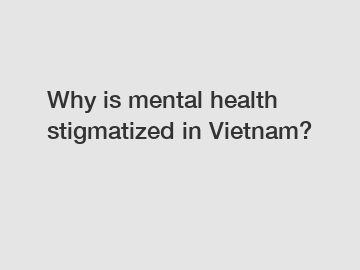Why is mental health stigmatized in Vietnam?
Why is Mental Health Stigmatized in Vietnam?
Mental health stigmatization is a pressing issue in Vietnam, and it is crucial to explore the reasons behind this phenomenon in order to address and alleviate the associated challenges. The root causes of this stigma can be attributed to cultural, historical, and societal factors, which have led to a widespread misunderstanding of mental health issues. Understanding the origins and implications of this stigma is essential to foster a more supportive and inclusive environment for individuals facing mental health challenges.
Cultural factors play a significant role in the stigmatization of mental health in Vietnam. The traditional beliefs and values that prioritize collectivism and conformity often discourage open discussions about mental health problems. Mental illness is frequently considered a personal weakness or a sign of bad character, as it is believed to bring shame upon the family. This cultural perception fuels the stigma and discourages individuals from seeking help or sharing their struggles with others. Consequently, mental health concerns often remain hidden, and individuals are left to suffer in silence.

Additionally, Vietnam's history has influenced the prevailing attitude towards mental health. The country endured decades of war, which resulted in widespread trauma and psychological distress among its citizens. Despite the immense psychological impact faced by the population, mental health concerns were often overlooked or dismissed due to competing priorities for rebuilding and development. This historical context has perpetuated the belief that mental health issues are not significant or deserving of attention, contributing to the current stigma surrounding these conditions.
Societal factors, such as limited access to mental health resources and inadequate education, also contribute to the stigmatization of mental health in Vietnam. The scarcity of mental health professionals and facilities leaves many individuals without proper support or treatment options. Moreover, the lack of widespread understanding and awareness of mental health conditions inhibits empathy and perpetuates stereotypes. Without access to accurate information, society continues to view mental health challenges as rare or even non-existent, maintaining the stigma and preventing individuals from seeking help.
The consequences of mental health stigmatization are detrimental to individuals and society as a whole. The fear of being judged or rejected prevents those in need from seeking professional help, exacerbating their suffering and potentially leading to more severe outcomes. Moreover, the stigma surrounding mental health perpetuates social isolation and discrimination. Individuals facing mental health challenges often experience exclusion from social activities, limited employment opportunities, and strained relationships, impeding their overall well-being and hindering their integration into society.
To combat the stigmatization of mental health in Vietnam, various steps can be taken. Education and awareness campaigns can play a crucial role in dispelling myths and promoting understanding. By increasing public knowledge about mental health, its prevalence, and available resources, the negative stereotypes can be challenged and reduced. Enhancing the access to mental health services and training healthcare professionals can also aid in delivering adequate care and support to individuals. Moreover, fostering a culture of empathy and compassion within families, schools, and communities can create a safe and supportive environment for those facing mental health challenges.
In conclusion, mental health stigmatization in Vietnam arises from a combination of cultural, historical, and societal factors. Recognizing and addressing these root causes is vital to create a more inclusive and supportive environment for individuals struggling with mental health issues. By dispelling myths, enhancing access to resources, and fostering empathy, Vietnam can strive towards a society that prioritizes mental well-being and helps individuals lead fulfilling lives.
Contact us to discuss your requirements of High Quality Citicoline Sodium, Citicoline Sodium for mental clarity , Citicoline Sodium and brain health . Our experienced sales team can help you identify the options that best suit your needs.

Comments